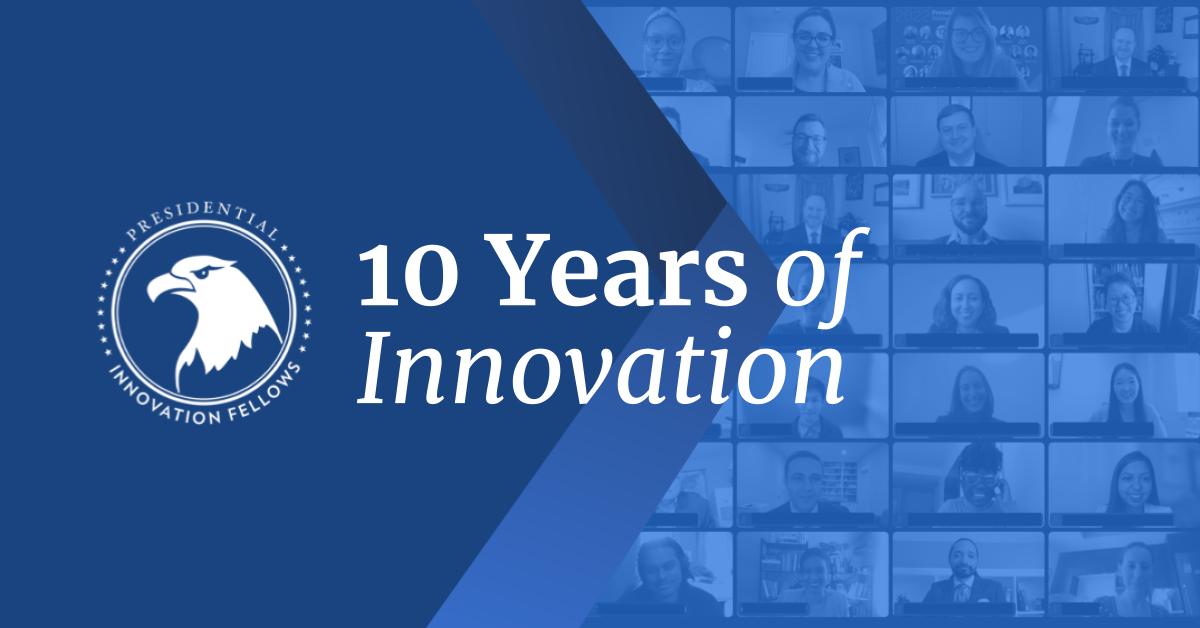
10 Years of the Presidential Innovation Fellows Program
Post filed in: Technology Transformation Services
We recently celebrated 10 years of the Presidential Innovation Fellows (PIF) program, which has welcomed about 200 private-sector experts to serve in about 50 agencies. Through it, federal agencies get access to new ideas and extraordinary tech talent. They can put both to work solving hard problems and delivering better government services to the American people.
What has that looked like?
In 2019, Nelson Colón Vargas used his data science expertise as a PIF at the U.S. Department of Veterans Affairs (VA). He integrated a machine-learning application programming interface (API) to automate veterans’ claims. Before this project, the VA manually processed over 98 percent of its 1.5 million claims. Vargas discovered a way to automate over 400K of those claims. He helped the VA save about $1.5 million. He also figured out a way to get benefits to veterans more quickly.
Another great example is Adele Luta, who served as a PIF at the National Institutes of Health. She worked with the NIH chief medical and scientific officer to create a better digital platform for researchers conducting long-term studies. These studies have helped us understand health and disease, including COVID-19, among underserved communities.
In addition, PIF Ryan Panchadsaram was part of the first cohort of 18 dynamic individuals who came from leading tech companies, nonprofits and academia. He worked on an effort to give millions of Americans a platform to access their personalized health data to make better health decisions. In fact, he went on to become the Deputy Chief Technology Officer of the U.S. Office of Science and Technology Policy (OSTP).
Nelson, Adele and Ryan are just a few individual examples of the program’s success since launching in 2012. Over the years, PIFs have focused on a wide range of projects related to areas such as:
-
Cybersecurity.
- Data modernization and strategy.
- Digital strategy.
- Harnessing artificial intelligence.
- Human-centered design for mapping and improving customer experiences.
- Software engineering.
As a country, we should be proud of all this great work that the PIFs have done.
I’m also proud of the fact that a group of PIFs were part of the founding team of 18F. 18F is an internal government tech consultancy at GSA that began working hand-in-hand with federal agencies to address and fix where customers experienced difficulty. In fact, I myself was part of 18F from 2016 to 2020. I saw firsthand how PIF participants were making significant contributions across the federal space.
The ongoing contributions of PIFs who serve for a tour of duty — or longer — in government is becoming clearer each day. They’re breaking down silos and building connectivity and community across government. We’re lucky to have several PIFs continuing their service right now within Technology Transformation Services (TTS) at GSA. At other agencies, PIFs have held titles such as deputy chief data officer at the Department of Commerce and chief design officer at Veterans Affairs.
Today, the work of PIFs has become closely aligned with efforts like the Executive Order on Transforming Federal Customer Experience and Service Delivery to Rebuild Trust in Government as well as the President’s Management Agenda. These efforts reflect the Biden-Harris Administration’s commitment to prioritizing every agency’s customers and delivering a seamless customer experience with every digital interaction.
Overall, the PIF program has delivered outstanding, sustainable results while saving money for taxpayers and improving the public’s experience along the way. We’re looking forward to building on that track record with even more technologists following in their footsteps.
In fact, we were so impressed by the program’s success that we were inspired to create a complementary program for early-career technologists in 2021 — the U.S. Digital Corps. The inaugural cohort of Digital Corps Fellows started just a few months ago. They are working at host agencies over the next two years.
I’d like to congratulate and thank everyone who has been involved in the PIF program. In particular, I want to thank the PIFs themselves for their public service. Their ideas and ingenuity have helped federal agencies learn and grow to provide better, simpler and more secure services to the public, building trust along the way.
If you’re reading this and you’re a senior technologist, keep an eye out for applications opening again in spring of 2023.
If you’re an agency seeking talented technologists and innovators, reach out to the PIF team.
Hear more from our PIFs on Twitter (@PIFgov) and LinkedIn (@WhiteHousePresidentialInnovationFellows). They share why they served, what they gained from their experience, and their impactful legacy for government and communities nationwide.

 U.S. General Services Administration
U.S. General Services Administration
